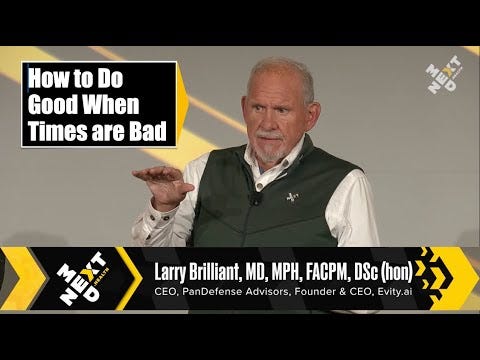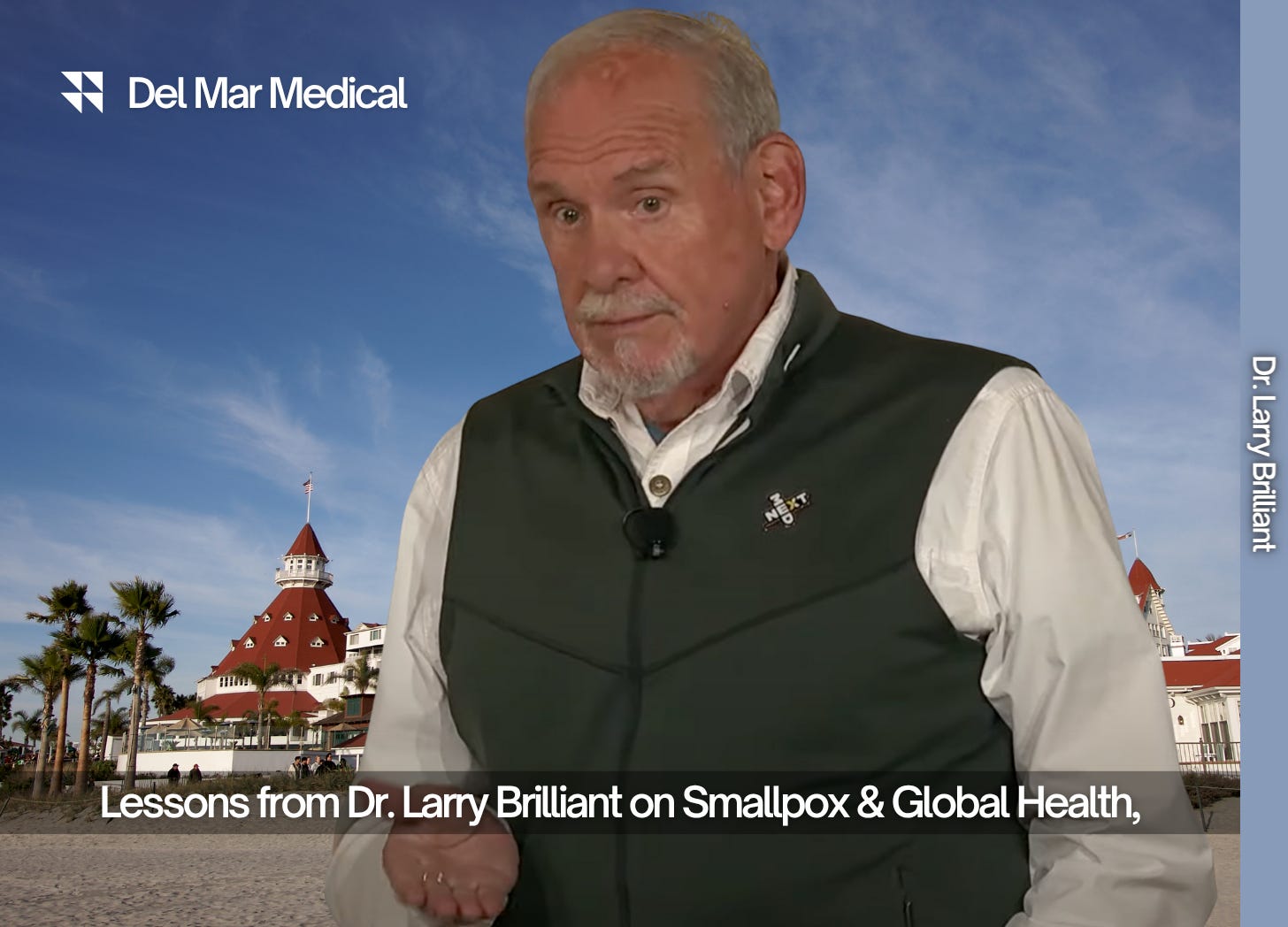Lessons from Dr. Larry Brilliant on Smallpox, Global Health, and the Future
A Moment of Reflection on Eid and Doctor’s Day
Dr. Larry Brilliant begins his talk by situating the day in the broader context of both Doctor’s Day and Eid al-Fitr, a significant Islamic holiday. He reflects on the meaning of Eid, connecting it to a pivotal moment in his own life and public health history: the final stages of the global smallpox eradication campaign. This combination of personal, religious, and professional milestones sets the tone for a powerful conversation about the intersection of science, ethics, sacrifice, and resilience.
“If what you’re about to do will help the most vulnerable person you’ve ever met, then you’re doing the right thing.” – Mahatma Gandhi (as told by Dr. Larry Brilliant)
How to Do Good When Times Are Bad: Dr. Larry Brilliant at NextMed Health 2025
The Last Case of Smallpox: A Story of Ethics and Sacrifice
Brilliant recalls being sent by the World Health Organization (WHO) to confirm whether the last case of variola major—the deadlier form of smallpox—had occurred in a Bangladeshi village. Despite being a strict vegetarian, he accepted a surgeon general’s invitation to break Eid fast with roast goat, understanding the gesture was key to gaining support for a critical public health operation.
This decision—balancing personal ethics with global impact—allowed a half-million-person search to proceed, confirming Raheem Banu as the last known case of the deadliest kind of smallpox. Without this confirmation, declaring smallpox eradicated would have been irresponsible and potentially catastrophic. This moment encapsulates the difficult, human trade-offs required in public health, and the immense power of cultural respect and diplomacy.
The Deadly History of Smallpox and the Power of Vaccines
Dr. Brilliant offers sobering context: smallpox killed 500 million people in the 20th century alone. Even during the 1960s "Summer of Love," millions of children died from it each year. The success of smallpox eradication stands as a "pinnacle of global health," only made possible through widespread vaccination.
He reminds the audience of the Latin root of the word vaccine—from “vacca,” meaning cow—because early smallpox vaccines used pus from cowpox-infected milkmaids. This linguistic origin illustrates both the humble and revolutionary beginnings of one of medicine’s most powerful tools.
Science in the Face of Global Tensions and Bioweapons
Brilliant situates the smallpox campaign during the Cold War, when the U.S. and USSR had tens of thousands of nuclear weapons aimed at each other. In a chilling detail, he reveals that the Soviets attempted to create a bioweapon by combining smallpox and Ebola.
Despite this existential threat, public health workers from across ideological divides worked together. He shares this to remind the audience: today’s challenges, while daunting, are not unprecedented, and collaboration has triumphed over chaos before.
Doing Good in Hard Times: Gandhi’s Amulet
To address despair in a time of polarization and anti-science sentiment, Brilliant invokes a story about Mahatma Gandhi. When a boy asked how to always do the right thing, Gandhi told him to ask whether his actions would help the poorest and most vulnerable person he had ever met. If yes, then the action was just.
This story serves as a moral compass for scientists, doctors, and anyone facing difficult ethical choices in chaotic times.
The Importance of the WHO: Imperfect but Indispensable
Turning to modern global health, Dr. Brilliant warns of the United States potentially withdrawing from the WHO. While he acknowledges the organization’s bureaucratic flaws—comparing its governance structure to a company where customers, employees, and investors must unanimously agree on everything—he fiercely defends its strategic value.
Economically, he explains, the $150 million spent globally on smallpox eradication yields an ongoing $5 billion annual return for the U.S. by eliminating the need for yellow fever vaccination cards and associated logistics.
Strategically, WHO is an early-warning system for pandemics. “If you think of other countries as your weather stations,” he says, “then WHO is how you find out that a storm is coming.”
Without the WHO, U.S. national security is at risk, as it would be blind to emerging threats like H5N1, H3N2, or COVID-19.
The Rising Threat of Measles and Vaccine Hesitancy
Brilliant responds to a clip from a 2019 documentary about measles outbreaks, showing how anti-vaccine rhetoric was already escalating before COVID. He connects these past fears to today’s measles resurgence, especially among unvaccinated children in the U.S.
Mandates for childhood vaccinations were originally designed to protect immunocompromised children in public schools. Today, however, rising vaccine hesitancy—fueled by misinformation—puts this entire system at risk. He recalls the thousands of children who died from smallpox, a memory that makes today’s vaccine skepticism feel particularly painful.
Vaccines and Longevity: The Unsung Heroes of Modern Life
Brilliant emphasizes that childhood vaccinations are the primary reason life expectancy has nearly doubled in the last century. He worked on the four-part TV series An Extra Life, which highlights how public health—not just medicine—has dramatically extended human life.
Yet post-COVID, instead of seeing renewed trust in vaccines, the world has witnessed a regression into misinformation, with vaccines again cast as suspicious or optional. This reversal is not just tragic—it’s dangerous.
The Power of Storytelling: Why Science Needs Hollywood
Admitting that scientists are often poor communicators, Brilliant shares how he co-created the movie Contagion in 2011 to realistically depict a pandemic. After the muted media response to H1N1, he realized narratives must be compelling to be believed, especially in a world saturated with misinformation.
While public health is about truth and precision, Hollywood knows how to tell a story. Contagion became a critical reference point during COVID. His takeaway: scientists must collaborate with artists and communicators to convey urgent truths.
Is Today Worse Than Ever? No, But It’s Still Dangerous
Brilliant provides historical context to counter the notion that we’re living through the worst moment in history. He recalls watching the aftermath of WWII—the Holocaust, Hiroshima, Nagasaki—and how those horrors led to the formation of international institutions like the WHO and UN agencies.
While those bodies are now aging and flawed, the friendships and professional networks they created remain invaluable. He still collaborates with Russian epidemiologists—proof that shared missions can outlast political tensions.
What You Can Do: From Health Span to Hope
Finally, Dr. Brilliant shares a personal project: building a company focused on increasing health span—not just life span. He warns that longevity without quality health is hollow. This new endeavor is his contribution to the world, and he encourages others to do the same:
Start something
Join something
Help someone
Don’t go through these uncertain times alone
In his words: “Find something good to do.”
Look for the Helpers
Dr. Larry Brilliant’s journey—from eradicating smallpox to advising Hollywood—serves as a call to action. In a time of anti-science fervor, institutional fatigue, and political polarization, his message is one of radical optimism through service. Citing Mr. Rogers, he closes with a reminder to “look for the helpers”—and more importantly, be one.
Trailblazer Recognized
The interview concludes with Dr. Brilliant receiving the NextMed Trailblazer Award, a fitting tribute to a man who’s spent his life in pursuit of a healthier, more connected, and more compassionate world.


